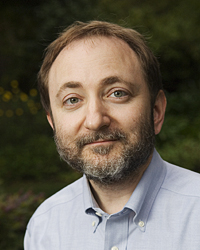Andrew Fire facts for kids
Quick facts for kids
Andrew Fire
|
|
|---|---|

Fire in 2008
|
|
| Born |
Andrew Zachary Fire
April 27, 1959 Palo Alto, California, U.S.
|
| Education | University of California, Berkeley Massachusetts Institute of Technology |
| Known for | RNA interference |
| Awards |
|
| Scientific career | |
| Fields | Pathology, genetics |
| Institutions | Johns Hopkins University Stanford University MRC Laboratory of Molecular Biology |
| Thesis | In vitro transcription studies of adenovirus (1983) |
| Doctoral advisor | Phillip Allen Sharp |
| Notable students | Jenny Hsieh |
Andrew Zachary Fire, born on April 27, 1959, is an American biologist. He is a professor of pathology and genetics at the Stanford University School of Medicine. In 2006, he won the Nobel Prize in Physiology or Medicine with Craig C. Mello. They received the award for discovering RNA interference (RNAi). This important research was done at the Carnegie Institution of Washington and published in 1998.
Contents
Early Life and Education
Andrew Z. Fire grew up in Sunnyvale, California. He attended Fremont High School. He then went to the University of California, Berkeley. There, he earned a degree in mathematics in 1978 when he was 19.
After Berkeley, he studied at the Massachusetts Institute of Technology (MIT). He earned his Ph.D. in biology in 1983. His mentor was Phillip Sharp, who also won a Nobel Prize.
Early Career and Research
After MIT, Fire moved to Cambridge, England. He worked as a postdoctoral fellow. He joined the MRC Laboratory of Molecular Biology. This group was led by another Nobel laureate, Sydney Brenner.
From 1986 to 2003, Fire worked at the Carnegie Institution of Washington. This is where he and his team made their big discovery. They found that double-stranded RNA could "turn off" genes.
In 1989, he also became a professor at Johns Hopkins University. Later, in 2003, he joined the faculty at Stanford University. His research has always been supported by grants from the U.S. National Institutes of Health.
Fire is a member of important scientific groups. These include the National Academy of Sciences. He also serves on scientific boards.
Discovering RNA Interference
In 2006, Andrew Fire and Craig Mello won the Nobel Prize in Physiology or Medicine. Their winning work was first published in 1998 in the journal Nature.
How RNA Interference Works
Fire and Mello, along with their team, found something amazing. They discovered that tiny pieces of double-stranded RNA (dsRNA) could stop specific genes from working. Imagine genes as instructions for making proteins. These dsRNA pieces would destroy the "messenger RNA" (mRNA). Messenger RNA carries the instructions from the gene to the protein-making parts of the cell.
When the mRNA is destroyed, the cell cannot make the protein. This effectively "shuts down" or "silences" that specific gene.
Why Their Discovery Was Special
Before Fire and Mello, scientists knew about a similar process. But Fire and Mello found that dsRNA was much better at gene silencing. Only a very small amount of dsRNA was needed to have a big effect. This suggested that the process was like a chain reaction. A small spark could lead to a large fire. Later research proved this idea.
The Nobel Prize committee said that Fire and Mello discovered "a fundamental mechanism for controlling the flow of genetic information." This means they found a basic way that living things control how their genes work. A scientist from the BBC said their work "completely revolutionised the whole way we think about biological processes." It opened up a whole new area of study in biology.
Awards and Honors
Andrew Fire has received many awards for his important work. Here are some of them:
- Meyenburg Prize in 2002
- National Academy of Sciences Award in Molecular Biology in 2003 (with Craig Mello)
- Wiley Prize in the Biomedical Sciences from Rockefeller University in 2003 (with Craig Mello, Thomas Tuschl, and David Baulcombe)
- Elected member of the National Academy of Sciences in 2004
- Brandeis University's Lewis S. Rosenstiel Award for Distinguished Work in Medical Research in 2005 (with Victor Ambros, Craig Mello, and Gary Ruvkun)
- Gairdner Foundation International Award in 2005 (with Craig Mello)
- Massry Prize in 2005 (with Craig Mello and David Baulcombe)
- Paul Ehrlich and Ludwig Darmstaedter Prize in 2006 (with Craig Mello)
- Nobel Prize in Physiology or Medicine in 2006 (with Craig Mello)
See also
 In Spanish: Andrew Fire para niños
In Spanish: Andrew Fire para niños
- History of RNA biology
- List of Jewish Nobel laureates
- List of RNA biologists
 | Delilah Pierce |
 | Gordon Parks |
 | Augusta Savage |
 | Charles Ethan Porter |

